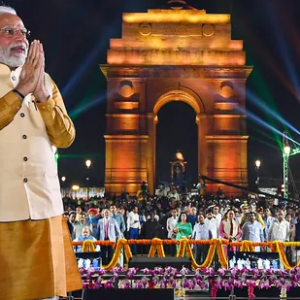 The Chair for the day Major General (Retd.) Dhruv Katoch welcomed the diverse gathering ranging from strategic thinkers to research scholars. He formally welcomed the speakers and briefly introduced them to the audience.
The Chair for the day Major General (Retd.) Dhruv Katoch welcomed the diverse gathering ranging from strategic thinkers to research scholars. He formally welcomed the speakers and briefly introduced them to the audience.
Shri Alok Bansal, Director, Centre for Security and Strategy, India Foundation initiated the proceedings by setting the context and providing a brief background about the Gilgit-Baltistan (GB) region. He highlighted the differences between GB and Mirpur-Muzaffarabad. GB is the most strategically significant part of J&K, and connects Pakistan and China. Analyzing the strategic significance of the region, he gave a succinct presentation to the audience about the people, the land, the historical background, the changing demography, the resources, the culture and the economic exploitation of GB region.
The chair for the day Major General (Retd.) Dhruv Katoch then welcomed Shri Senge H. Sering, President, Institute of Gilgit-Baltistan Studies, Washington to speak on the subject. Sh. Sering said that he is extremely grateful to India Foundation and Jammu Kashmir Study Centre for organizing discourses and discussions on the otherwise ignored issue of Gilgit Baltistan region. He started by observing that, “It was the people of Baltistan who gave Buddhism to Central Asia, and thus the relationship with this region goes far back than 1947.” While the area is very commonly associated with the Silk Route, there are other important trade routes as well. The China-Pakistan economic corridor is expected to cut distance from China to Pakistan from 22 days to less than 3 days. It is an important location geographically which is a key for development, trade ties, geo-politics etc. Speaking on peace he said, “Gilgit is more peaceful than Afghanistan, so it is more ideal for China to invest in.” He gave some of the precious insights into the living condition of the people. He also talked about the increasing Chinese influence in the G-B region. The influence can be seen everywhere, as many of the roads and highways in G-B are being built by China. Chinese presence can be felt at the grass root level too as they are coming up with Chinese markets, local street shops, and even schools and cultural centers. It can be easily said that China will be able to dominate G-B in the next 15-20 years.
On concerns he said, “There are two main issues in the region that we must look into: Violence and Terrorism. It is important to note that economic development, infrastructure development, improving trade routes, revival of culture, opening borders etc. will all help in combating terror and reducing violence in the region. Another major concern that he pointed out was the plight of the local populace wherein he observed, “There is no structured policy or program to benefit the locals. Eventually, they might even face the fate of Tibetans. They are technically not part of any nation, so it does not help!”
After the detailed presentations, the Chair opened the floor for questions. Questions were raised on current status, nationality and growing Chinese influence in the region; to which Sh. Sering replied, “If China wants this land to be peaceful, they must condemn and fight all forms of terrorism – not only select issues or types. There is expected to be over 100 Billion dollars of Chinese investment in this region.” On point of nationality he said, “We have a Pakistani passport, which serves as a travel document, but apart from that it being of Pakistani nationality does not help much – we can’t vote, we can’t access the judicial system etc.” As a solution to which he suggested, “A civil society movement is needed to really see big changes in the way this region and its people are treated. Therefore, more awareness is crucial so that the region starts talking about issues such as Human Rights etc.”
The concluding remarks were given by Chair General Katoch, “Both universities and institutions must play a key role in raising awareness about this important issue.” Gen. Dhruv Katoch subsequently thanked everyone for participating in the Seminar and making it a fruitful discussion.




